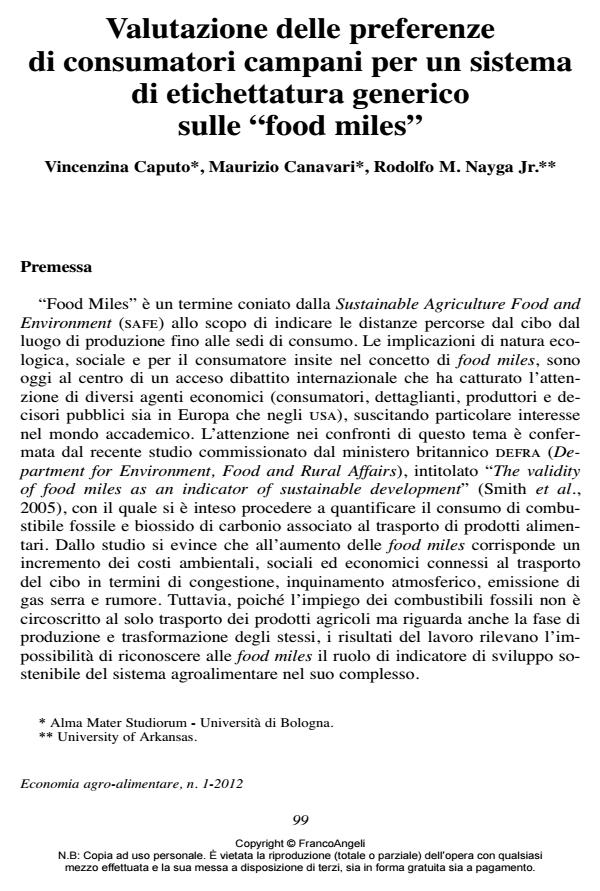Valutazione delle preferenze di consumatori campani per un sistema di etichettatura generico sulle "food miles"
Titolo Rivista ECONOMIA AGRO-ALIMENTARE
Autori/Curatori Vincenzina Caputo, Maurizio Canavari, Jr. Rodolfo M. Nayga
Anno di pubblicazione 2012 Fascicolo 2012/1
Lingua Italiano Numero pagine 17 P. 99-115 Dimensione file 273 KB
DOI 10.3280/ECAG2012-001005
Il DOI è il codice a barre della proprietà intellettuale: per saperne di più
clicca qui
Qui sotto puoi vedere in anteprima la prima pagina di questo articolo.
Se questo articolo ti interessa, lo puoi acquistare (e scaricare in formato pdf) seguendo le facili indicazioni per acquistare il download credit. Acquista Download Credits per scaricare questo Articolo in formato PDF

FrancoAngeli è membro della Publishers International Linking Association, Inc (PILA)associazione indipendente e non profit per facilitare (attraverso i servizi tecnologici implementati da CrossRef.org) l’accesso degli studiosi ai contenuti digitali nelle pubblicazioni professionali e scientifiche
Our study is aimed at evaluating whether or not different food miles information displayed on labels such as information on the distance and time that the food traveled (nKm) and information on CO2 emission (CO2) during food transportation can affect consumer choice in the case of fresh tomato product. We also examined: (i) the level of sensitivity and knowledge of consumers with regard to the impacts of agro-food system in terms of environmental pollution; (ii) consumers’ perception of the effects produced by food transportation; (iii) the degree of importance that consumers attach to information directly or indirectly related to the sustainability of a food product. We conducted a quantitative survey in Naples (Italy) using a discrete choice approach. The data were analyzed using univariate analysis techniques (frequencies) and the estimation of the multinomial logit model (mnl). The results of the univariate analysis show that respondents actually perceive food products distribution as the phase that causes a high negative impact on the environment. The results of the mnl model suggest that on average consumers choices are affected by all the attributes of fresh tomato included in the experimental design. However. a comparison across different fresh tomato attributes suggests that respondents in our sample get the highest utility when nkm label is present, followed by the presence of other sustainability-linked attributes such as organic, CO2.
Parole chiave:Food miles, consumer preferences, multinomial logit model, willingness to pay, Naples
Jel codes:D12, M31, Q00
- Determinants of Fruit Purchasing Decision Among Singaporean Consumers: An Empirical Study Chubashini Suntharalingam, Thanuja Rathakrishnan, Suhana Safari, in Journal of International Food & Agribusiness Marketing /2023 pp.336
DOI: 10.1080/08974438.2021.2006106 - Green marketing strategies in the dairy sector: Consumer‐stated preferences for carbon footprint labels Maurizio Canavari, Silvia Coderoni, in Strategic Change /2019 pp.233
DOI: 10.1002/jsc.2264
Vincenzina Caputo, Maurizio Canavari, Jr. Rodolfo M. Nayga, Valutazione delle preferenze di consumatori campani per un sistema di etichettatura generico sulle "food miles" in "ECONOMIA AGRO-ALIMENTARE" 1/2012, pp 99-115, DOI: 10.3280/ECAG2012-001005